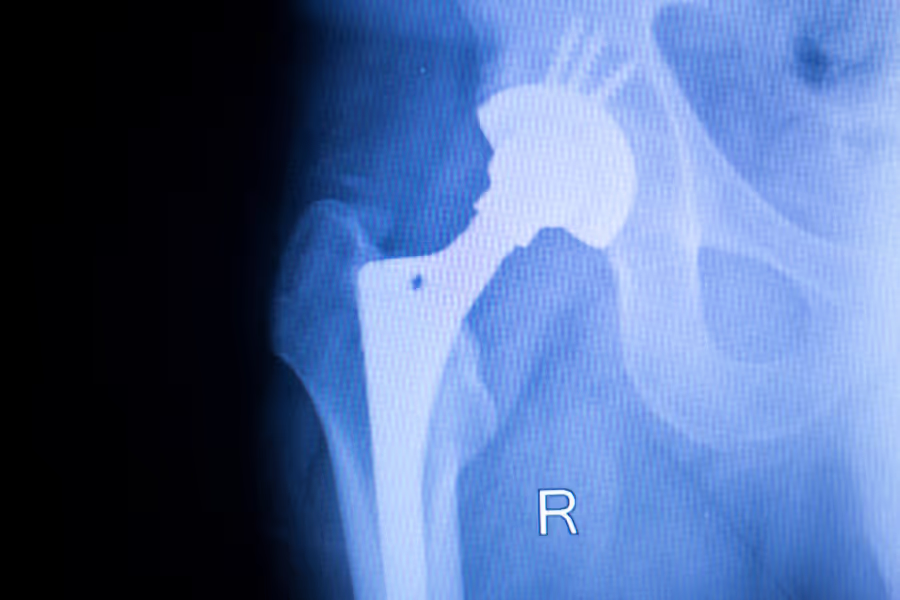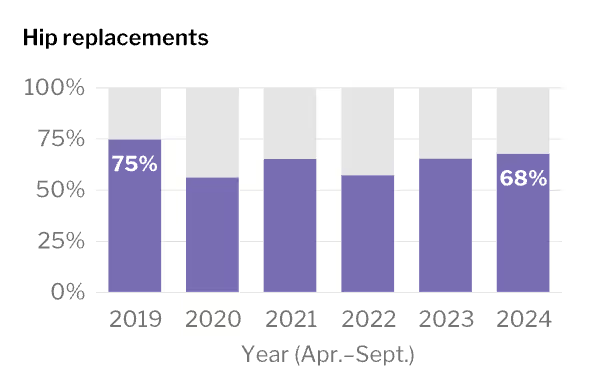What Is the Average Age for Hip Replacement in Canada?
For many years, the “typical” hip replacement patient in Canada has been about 65 years old. Most patients are between 60 and 80 and have serious hip arthritis that makes everyday life hard.
Today, though, surgeons are also seeing more patients in their 40s and 50s. This change is happening because:
- People want to stay active longer
- Doctors are spotting joint problems earlier
- Patients are less willing to live with constant pain when surgical intervention is an option
It is important to know that surgeons do not use age alone to decide who gets a hip replacement. They focus on:
- How bad your pain is
- How much your movement and function are limited
- What your X‑rays or scans show

How the Average Is Changing Over Time
The average age hip replacement patients are getting younger for a few reasons:
- More active lifestyles
- People want to keep working, exercising, and enjoying life. When hip pain stops them from doing that, they look for answers sooner.
- Earlier diagnosis of hip problems
- Conditions like hip dysplasia (hip joint not formed normally), congenital issues, or damage from old sports injuries are being caught earlier. Over time, these can wear out the hip joint and lead to surgery at a younger age.
- Higher expectations for quality of life
- Many people no longer accept years of limping and pain as “just getting older.” They ask their doctors whether surgery could help them sooner.
Why Pain and Function Matter More Than Age
When surgeons think about hip replacement timing, they look at practical questions like:
- Can you walk more than a few minutes without severe pain?
- Are you able to sleep through the night?
- Can you manage stairs, grocery shopping, and basic chores?
- Do your X‑rays show serious joint damage (often called “bone‑on‑bone”)?
In other words:
- A 45‑year‑old with constant, severe pain, very limited walking, and bad joint damage may be a strong candidate.
- A 73‑year‑old with mild symptoms and slower joint changes might not need surgery yet.
Age is part of the picture, but pain and function are what truly drive the decision.
What Age Is Best to Have a Hip Replacement?
There is no “best” age for a hip replacement. Instead, the right timing depends on:
- How bad your pain is
- How much your hip affects your daily life
- Your overall health
- How quickly your symptoms are changing
That said, surgeons think about different trade‑offs for younger and older patients.
- Younger patients (under ~60)
- Often have stronger muscles and bones, which can help recovery.
- But because they are younger, they may need a second surgery (revision) later in life when the first artificial hip wears out.
- Older adults (60s, 70s, 80s)
- Can gain a lot of independence and pain relief from surgery.
- But there may be more concerns about other health problems, bone strength, or balance.
The goal is to choose a time where surgery will give you back the most life, without waiting so long that damage and weakness make recovery harder.
Read our Hip Replacement procedure page for an in-depth overview of the surgery.

Benefits of Early Surgery (When Appropriate)
In some cases, not waiting too long for surgery can have clear benefits:
- Faster return to normal life
- Dealing with the joint before you lose too much strength and flexibility can make it easier to get back to regular activities.
- Better long‑term movement
- If surgery happens before your hip becomes extremely stiff, you may keep more natural movement after recovery.
- Less time in severe pain
- Instead of spending years on strong painkillers or barely moving, surgery can shorten the period of worst pain.
Of course, earlier surgery needs to be balanced against the higher chance of needing a revision later, especially in younger hip replacement candidates.
Risks of Waiting Too Long
Delaying hip replacement can also cause real problems:
- More stiffness and weakness
- If walking is painful, you naturally move less. Over months or years, muscles shrink and joints stiffen, which can make recovery longer.
- Higher risk of falls
- A painful, unstable hip can affect your balance. Falls can lead to fractures or other injuries.
- Harder surgery and rehab
- In very advanced arthritis, the joint and surrounding tissues may be more damaged. This can make the operation and the recovery more complex.
If you are skipping family events, avoiding trips, or planning your day around your hip pain, it may be time to talk with your doctor again about timing.

Who Typically Gets Hip Replacement in Canada?
Hip replacement is done for people of many ages, from teenagers (rare) to people in their 80s or beyond.
Teenagers and Young Adults
Hip replacement is very rare in teens and young adults. When it does happen, it is often because of:
- Severe congenital hip problems
- Juvenile arthritis that has badly damaged the joint
- Previous surgeries that did not solve the problem
These cases are carefully reviewed, because the person will likely need more than one hip replacement over their lifetime.
Middle‑Aged Adults (40s–50s)
This is the group where hip replacements are increasing the most. Common reasons include:
- Early osteoarthritis
- Hip dysplasia that was not treated earlier in life
- Joint damage from sports or physically demanding jobs
People in this age range are often still working and may have children at home. For them, the goal is to stay active and independent at work and with family.
Older Adults (60s–80s)
Adults in their 60s, 70s, and early 80s make up the largest group of hip replacement patients in Canada. Most have:
- Long‑term osteoarthritis
- Increasing problems with walking and daily tasks
- A strong wish to stay independent and avoid moving into higher‑care settings
Many people in this age group worry they may be “too old,” but if they are otherwise healthy enough for surgery, they can still benefit a lot.
Age Group Comparison Table
How Canadian Wait Times Affect Outcomes Across Age Groups
In many provinces, public wait times for hip replacement are 4-24 months+. Only 68% of patients are seen within the target 6months. This affects patients of all ages:
- All ages:
- Longer waits mean more months of pain, less movement, and worse sleep. Mental health often suffers.
- Younger working adults:
- They may have to cut back on work, change jobs, or stop working while they wait. This can cause financial stress for the whole family.
- Older adults:
- Each year of low activity can lead to weaker bones and muscles. This increases the risk of falls, fractures, and loss of independence.

Because of this, some people consider private orthopedic surgery. This does not replace the public system but gives another option for those who feel the need to move faster.
If you are curious about costs, you can check out these guides for Canada and Alberta.
Making the Right Decision at the Right Time
The average age for hip replacement in Canada is about 65, but surgery is also done in younger and older people.
Younger hip replacement candidates may need a second surgery later, but they also want to stay active and working. Older adults can gain important pain relief and independence, even in their 70s or 80s.
The key questions are:
- How bad is your pain?
- How limited is your daily life?
- What do your scans show?
- How are your other health conditions?
If you or a loved one is on a long waitlist or unsure about timing, you do not need to face these decisions alone.
Surgency is a physician‑founded platform that helps Canadians:
- Compare private hip replacement surgery providers
- See clinic and surgeon credentials
- View timelines and costs clearly
- Book consultations while staying on the public waitlist if you choose
Compare private hip replacement surgery providers on Surgency
FAQs About Age & Hip Replacement
Is 50 too young for a hip replacement?
- No. 50 is not automatically too young. If you have severe pain, clear joint damage on scans, and your daily life is strongly affected, surgery may be reasonable. You should, however, discuss the higher chance of needing a revision surgery later in life.
Is 80 too old for a hip replacement?
- Not always. People in their 80s can still have successful hip replacements. The main questions are:
- Are you healthy enough overall for surgery?
- How will surgery affect your independence and safety?
- Do you have support for recovery?
- A careful medical check‑up is important, but age alone is not the only factor.
What happens if you wait too long to get a hip replacement?
- Waiting too long can mean:
- More stiffness and weakness
- Higher risk of falls and fractures
- A longer and harder recovery
Are younger patients more likely to need revision surgery?
- Yes. Because they live longer with their artificial hip, younger patients are more likely to need at least one revision surgery in the future. This is one of the main trade‑offs discussed when planning surgery at a younger age.




